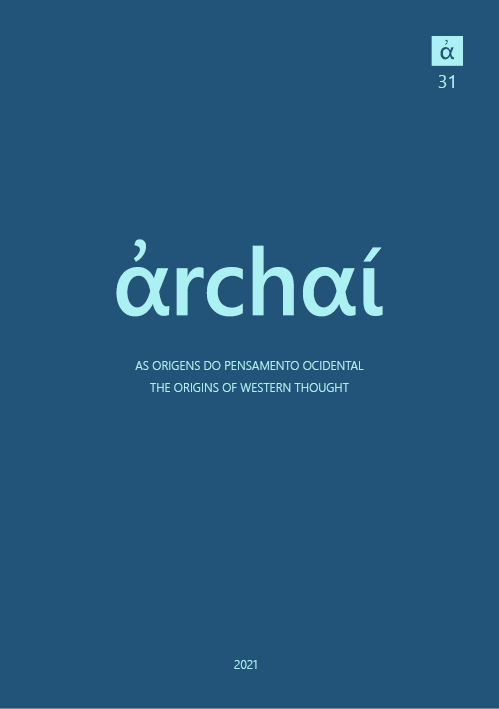Superare Parmenide: Zenone, Melisso e Gorgia impegnati a fare ‘meglio di lui’
DOI:
https://doi.org/10.14195/1984-249X_31_25Keywords:
Parmenides, Zeno, Melissus, Gorgias, OntologyAbstract
During the fifth century BCE Parmenides had many and qualified readers, among whom Zeno, Empedocles, Anaxagoras, Leucippus, Melissus, Protagoras, Gorgias, Hippias. Three of them tried to do much more than what he was able to do with the ‘deductive exercise’ we encounter in 28B8.1-33 (or, in the case of Melissus, with the whole doctrine of being), and they succeeded. Indeed, that they strived to overcome the high standard already reached by Parmenides in the invention of strictly deductive passages is basically out of the question. My paper is devoted to account for the ambitious aims Zeno, Melissus, and Gorgias attained, each in a very distinguished manner.Downloads
References
BARNES, J. (1979). The Presocratic Philosophers. London, Routledge & Kegan Paul.
BARNES, J. (1979). Parmenides and the Eleatic One. Archiv für Geschichte der Philosophie 61, p. 1-21.
BERNABÉ, A.; MENDOZA, J. (2019). ’Ser’ y ‘no ser’ en el Rig Veda y en Parménides; usos diversos de un mismo recurso. In:
BERRUECOS, F.; GIOMBINI, S. (eds.) Eleatica 7. Parmenide: tra linguistica, letteratura e filosofia / Parménides: entre lingüística,
literatura y filosofía, Eleatica 7. Baden Baden, Academia Verlag, p. 253-268.
BREMOND, M. (2017). Lectures de Mélissos. Èdition, traduction et interpretation des témoignages sur Mélissus de Samos. BerlinBoston, De Gruyter.
BREMOND, M. (2019). Mélissos, Gorgias et Platon dans la première hypothèse du Parménide. Revue de philosophie ancienne 37, p. 61–99.
BUNNIN, N.; -YU, J. (2001). Dictionary of Western Philosophy: English-Chinese. Beijing, Wiley & Sons.
CASERTANO, G. (2015). Da Parmenide di Elea al Parmenide di Platone. In: GAMBETTI, F.; GIOMBINI, S. (eds) Eleatica 2011. Sankt Augustin, Academia Verlag.
CASSIN, B. (1998). Parménide, Sur la nature ou sur l'étant. Le grec, langue de l'être?. Paris, Éditions du Seuil.
CHERUBIN, R. (2003). Inquiry and What Is: Eleatics and Monisms, Epoché 8, p. 1-26.
CORDERO, N.-L. (2004). By Being, It Is. The Thesis of Parmenides. Las Vegas, Parmenides Pub.
CURD, P. (2004). The Legacy of Parmenides. Eleatic Monism and Later Presocratic Thought. Las Vegas, Parmenides Pub (1 ed.
Princeton, 1998).
FINKELBERG, A. (1988). Parmenides: Between Material and Logical Monism. Archiv für Geschichte der Philosophie 70, p. 1-14.
IMBRAGUGLIA, G. (1974). Ordinamento assiomatico nei frammenti parmenidei. Milano, Marzorati.
LAKS, A.; MOST, G. (2016). Early Greek philosophy. Cambridge MA, Loeb Classical Library.
LAKS, A.; MOST, G. (2016). Les débuts de la philosophie, des premiers penseurs grecs à Socrate. Paris, Fayard.
MANSFELD, J. (2016). Melissus Between Miletus and Elea. In: PULITO, M. (ed.) Eleatica 5. Sankt Augustin, Academia Verlag.
MARCACCI, F. (2009). Alle origini dell’assionatica: gli Eleati, Aristotele, Euclide. Roma, Aracne.
MARCACCI, F. (2020). Argumentation and counterfactual reasoning in Parmenides and Melissus. Archai 30, p. 1-30.
MAZZARA, G. (1999). Gorgia. La retorica del verosimile, Sankt Augustin, Academia Verlag.
MEINONG, A. (1904). Untersuchungen zur Gegenstandstheorie und Psychologie. Leipzig, J. Barth.
NAPOLI, V. (2012). Le denominazioni della Metafisica e della sua scienza nella filosofia tardoantica. Peitho Examina Antiqua 3, p. 51-82.
PALMER, J. (2009). Parmenides and Presocratic Philosophy. New York, Oxford University Press.
PULPITO, M. (2010). Monismo predicazionale. Sui limiti di un’interpretazione epistemologica dell’eleatismo. Méthexis 23, p. , 5-33.
PULPITO, M. (2018). Melisso critico di Parmenide: una rivalità mimetica. Archai 22, p. 17-40.
ROSSETTI, L. (2016). Verso una rhetorica universalis. , p. 27-48.
ROSSETTI, L. (2020a). Parmenide e Zenone sophoi ad Elea. Pistoia, Petite Plaisance.
ROSSETTI, L. (2020b). Verso la filosofia. Nuove prospettive su Parmenide, Zenone e Melisso. Baden Baden, Academia Verlag.
SEDLEY, D. (1999). Parmenides and Melissus. In: LONG, A.A. (ed.) The Cambridge Companion to Early Greek Philosophy. Cambridge, Cambridge University Press, p. 113-133.
UNTERSTEINER, M. (1955). L’essere di Parmenide è oulon, non en. Rivista Critica di Storia della Filosofia 10, p. 5-23.
WEDIN, M.W. (2014). Parmenides’ Grand Deduction. A Logical Reconstruction of the Way of Truth. New York: Oxford University
Press.
YU, J. (1999). The Language of Being: Between Aristotle and Chinese Philosophy. International Philosophical Quarterly 39, p. 439-454.
Downloads
Published
How to Cite
Issue
Section
License
Copyright (c) 2021 Livio Rossetti

This work is licensed under a Creative Commons Attribution 4.0 International License.
Given the public access policy of the journal, the use of the published texts is free, with the obligation of recognizing the original authorship and the first publication in this journal. The authors of the published contributions are entirely and exclusively responsible for their contents.
1. The authors authorize the publication of the article in this journal.
2. The authors guarantee that the contribution is original, and take full responsibility for its content in case of impugnation by third parties.
3. The authors guarantee that the contribution is not under evaluation in another journal.
4. The authors keep the copyright and convey to the journal the right of first publication, the work being licensed under a Creative Commons Attribution License-BY.
5. The authors are allowed and stimulated to publicize and distribute their work on-line after the publication in the journal.
6. The authors of the approved works authorize the journal to distribute their content, after publication, for reproduction in content indexes, virtual libraries and similars.
7. The editors reserve the right to make adjustments to the text and to adequate the article to the editorial rules of the journal.



